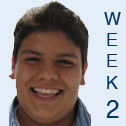Learning Languages
READING SESSION B
The following reading is an excerpt from Learning Language, Timothy Mason, Maître de conferences, Université de Paris 8.
After reading the article, you will be instructed to write a paragraph summarizing Chomsky’s arguments regarding language development and a paragraph summarizing the views of his critics.
Excerpt From "Language Language", Chomsky and Language Learning
Noam Chomsky is perhaps the best known and the most influential linguist of the second half of the Twentieth Century. He has made a number of strong claims about language: in particular, he suggests that language is an innate faculty - that is to say that we are born with a set of rules about language in our heads which he refers to as the 'Universal Grammar'. The universal grammar is the basis upon which all human languages build. If a Martian linguist were to visit Earth, he would deduce from the evidence that there was only one language, with a number of local variants. Chomsky gives a number of reasons why this should be so. Among the most important of these reasons is the ease with which children acquire their mother tongue. He claims that it would be little short of a miracle if children learnt their language in the same way that they learn mathematics or how to ride a bicycle. This, he says, is because:
- Children are exposed to very little correctly formed language. When people speak, they constantly interrupt themselves, change their minds, and make slips of the tongue and so on. Yet children manage to learn their language all the same. This claim is usually referred to as the Argument from Poverty of the Stimulus.
- Children do not simply copy the language that they hear around them. They deduce rules from it, which they can then use to produce sentences that they have never heard before. They do not learn a repertoire of phrases and sayings, as the behaviorists believe, but a grammar that generates an infinity of new sentences.
Children are born, then, with the Universal Grammar wired into their brains. This grammar offers a certain limited number of possibilities - for example, over the word order of a typical sentence.
Some languages have a basic SVO structure.
The teacher gave a lecture.
75% of the world's languages use either this (English, French, Vietnamese) or SOV (Japanese, Tibetan, Korean) - others prefer VSO (10 - 15% - Welsh) or VOS (Malagasy) * Some languages, such as Latin, appear to have free word order, but even here, SOV is very common. OSV is very rare - but you will find an example in the speech of Yoda, in Star Wars.
Strong with the force you are.
When the child begins to listen to his parents, he will unconsciously recognize which kind of a language he is dealing with - and he will set his grammar to the correct one - this is known as 'setting the parameters'.
It is as if the child were offered at birth a certain number of hypotheses, which he or she then matches with what is happening around him. He knows intuitively that there are some words that behave like verbs and others like nouns, and that there is a limited set of possibilities as to their ordering within the phrase. This is not information that he is taught directly by the adults that surround him, but information that is given. It is as if the traveler were provided at the beginning of his journey with a compass and an astrolabe.
This set of language learning tools, provided at birth, is referred to by Chomsky as the Language Acquisition Device. (Notice that he uses the term "acquisition" rather than learning).








